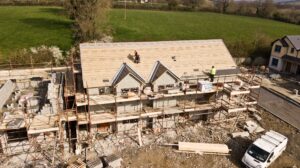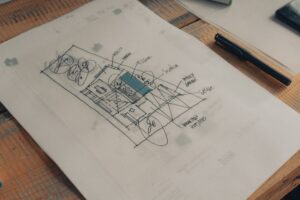
What to Expect with a Home Inspection Report
When you’re in the midst of buying a home, you’ll want to be confident that you’re making a wise investment before the sale goes through. One of the biggest mistakes that potential homeowners make is not obtaining an inspection when they make an offer on a home. While a home appraisal will tell you the value of a home, an inspection is the only way for you to identify potential problem areas throughout the home. The home inspection report that’s created after the inspection takes place will give you a good understanding of things that need improvement.
The home inspection report that you receive will outline issues that require attention, details of what these issues are and how they can impact your home, and a summary that takes a look at the most pressing concerns. At this stage in the closing process, you will be able to use the information from the home inspection report in any way you see fit. If there are hardly any issues listed in the report, you could proceed with the sale of the home without making any further addendums.
On the other hand, it’s common for larger problems to be discovered during a home inspection. These problems include everything from water damage in the basement to roofing issues. If the HVAC system is getting old or the boiler has become less efficient, these problems will be noted in the report that you receive. If the problems are severe enough, you’ll have a couple of options at your disposal. For one, you could ask the seller to lower the purchase price to accommodate the repairs that you’ll need to perform. You could also ask this individual to make the repairs themselves while the closing process is still ongoing.
Before you obtain a home inspection for a property that you’re interested in, keep in mind that you will pay for the inspection costs yourself. The total cost of the inspection depends on a range of factors that include the size of the home and the types of issues that are identified. The report that’s created once the inspection occurs can be sent to you as a PDF or HTML file. While your real estate agent should help you understand the report and everything in it, the following guide provides you with an in-depth look at home inspection reports, their costs, and what information is contained in the report.
What Variables Affect the Home Inspection Costs?

If you’re getting ready to request a home inspection, it’s important to understand the numerous variables that can directly affect the price you pay for the inspection. The main variables that can determine inspection costs include:
- Where your home is located
- Total travel time for the professional inspector
- The size of your home
- The age of your home
- The current health of the real estate market in the surrounding area
- The number of professional inspectors who are nearby your home
- How busy the inspector is
- Additional services that you request, which could include anything from mold testing to radon testing
Any extra services that you obtain alongside the standard inspection will invariably add to the cost and time it takes for the inspection to be completed. However, many of the extra services that can be performed by a professional inspector are essential if you want to be wholly confident in your purchasing decision.
Home Inspection Costs

The national average cost for a home inspection is right around $358. However, costs can range from $350-$600 depending on the factors mentioned previously. Since you’re making a large investment, it’s important that you take steps to protect this investment, which can be done by scheduling a home inspection. While the costs might seem high, the benefits of a home inspection typically far outweigh the costs.
If even a single major problem is found with the home, you could ask for the homeowner to fix the repair before making your purchase. You could also ask for the sale price to be reduced or can back out of the deal entirely. Without a home inspection, you may make the mistake of investing in a home that will require several major repairs soon after purchase, which will cost substantially more money than it would take for an inspection.
Along with the base costs for a home inspection, you could also obtain some add-on features for a more comprehensive inspection. Some of the more specialized inspections available to you include a roof inspection, a pest inspection, a radon inspection, and a mold inspection. Likely the most important of these add-ons include pest inspection and mold inspection.
Pest inspections are designed to look for rodents, termites, and other pests that could cause significant damage to the structure of the home you’re interested in. As for a mold inspection, mold is a kind of fungi that tends to grow in areas where the water damage has occurred. This fungus can grow in areas around your home that are more difficult to see. Keep in mind that mold can also cause serious health problems, which is why it’s recommended that you obtain a mold inspection when scheduling a standard home inspection.
Main Places Inspected
The main places in a home that are inspected with a home inspection include:
- The exterior and grounds of the home
- The basement and foundation
- Any heating and cooling systems
- The electrical system
- The plumbing system
- The fireplace
- The attic and ventilation system
- Doors and windows throughout the home
How Long Will a Home Inspection Take?

If you’re wondering how long home inspections take, the length of time depends on the size of the home that’s being inspected. Larger homes will invariably take longer to inspect than smaller homes. In most situations, a home inspection will take around 2-3 hours to be completed. If the home is larger in size and contains more than one HVAC system, the inspection could take around 4-5 hours to be completed. Keep in mind that the number of items that need to be inspected will also play a part in what you pay for the inspection.
While the size of the home and the number of appliances contained within the property will dictate how long it takes to complete the inspection as well as what the price will be, some of the factors that don’t change the price include the extent of the inspection, the number of photos that are taken, and the written inspection report that you receive. If ever a professional inspector tells you that you’ll need to pay extra for an inspection report, you should choose someone else to perform the task.
What Should You Make of a Home Inspection?
When you first make an offer on a home, you’ll likely notice that a contract is written immediately that details some of the terms of the purchase. In most contracts, it’s stipulated that a home inspection must be completed before a specific date. A pest inspection may also be required. What you do after the home inspection depends on what the home inspection reports says. You’ll receive comprehensive details and photos of any areas of the home that may be falling into disrepair, which should make it easier for you to decide what to do next.
As mentioned previously, there are numerous options available to you once you receive the report. If no major issues were detected in and around the property, you could accept the contract without making any further demands. In many cases, at least one major problem will be found. Whether the HVAC unit has started to malfunction or some water damage is detected around the home, you’ll have a decision to make. If the problems are significant and seemingly insurmountable, you could back out of the deal entirely without losing your earnest money deposit.
If you truly want the home, however, you’ll have some power for future negotiations. In the event that a couple of substantial repairs are needed, you could ask the seller to lower the sale price, which could reduce the amount of money you need to take out on a loan. Many buyers will instead choose to request that some of the closing costs are covered. The closing costs that you pay as the buyer will come out of your pocket directly, which is why it can be helpful to reduce these costs if such an opportunity arises.
Another option available to you is to request that the seller makes certain repairs before the closing date arrives. At this point, the seller will have a day or two to agree with your request. Unless the necessary repairs are substantial, this shouldn’t delay the closing process. While many problems that are detected by a home inspection can be fixed, there are also some issues that you should be wary of when discussing the home inspection report.
If foundation damage or roofing damage was detected, the repair costs could be too high to justify the investment that you’re about to make. Damage to the foundation could also indicate that further damage could occur in the future because of how the home was built. No matter what types of problems are found in the home inspection, you should be able to save an ample sum of money in the long run. By identifying potential repairs and replacements before you make the purchase, you won’t be required to make the repairs with your own money.

Jason Somers, President & Founder of Crest Real Estate
With over 15 years of professional experience in the Los Angeles luxury real estate market, Jason Somers has the background, judgement and track record to provide an unparalleled level of real estate services. His widespread knowledge helps clients identify and acquire income producing properties and value-ad development opportunities.
Learn more about Jason Somers or contact us.



